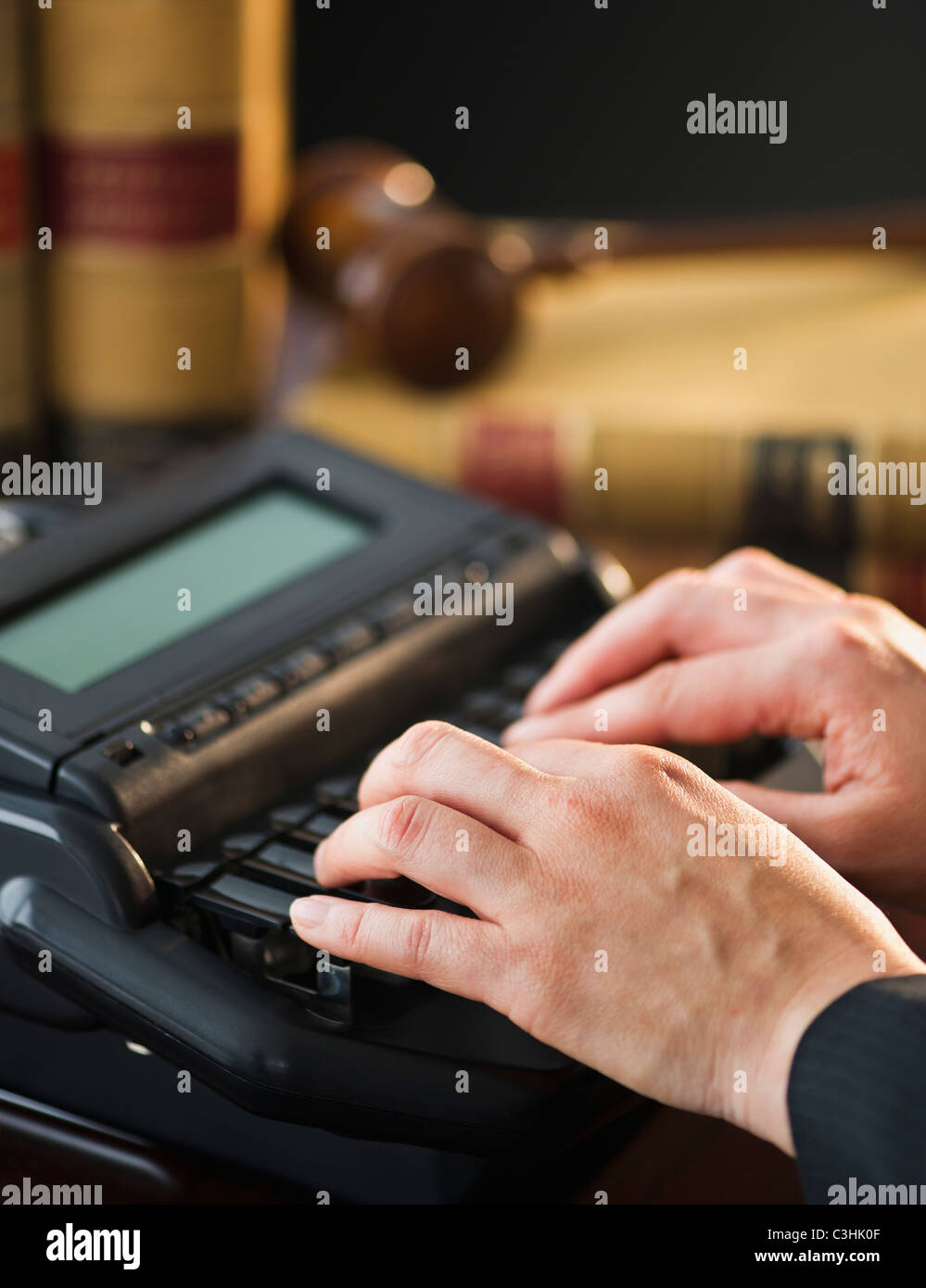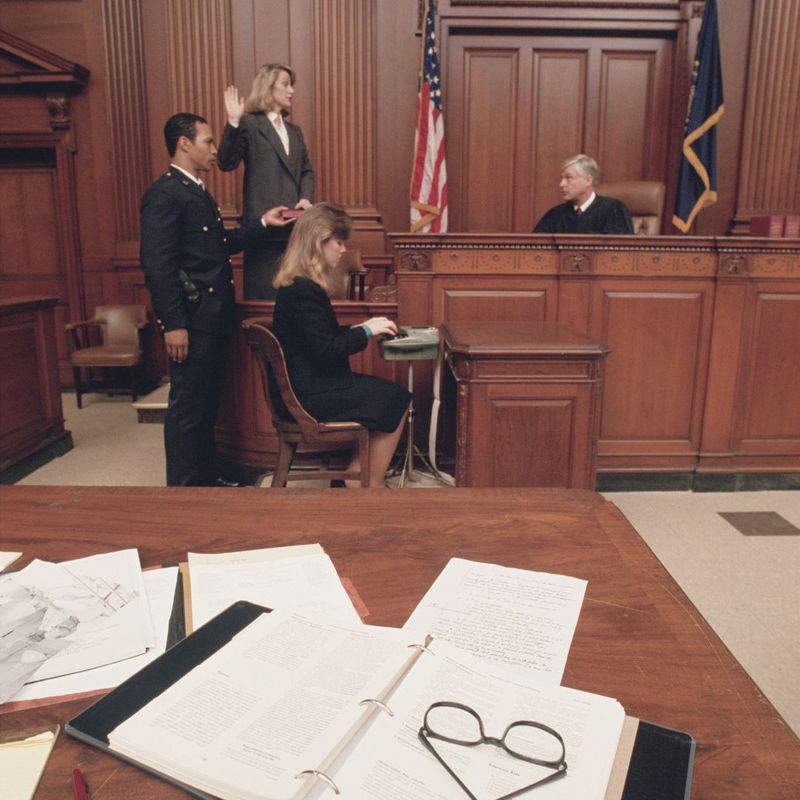Court Typist vs. Stenographer: Exploring the Key Differences
Court Typist vs. Stenographer: Exploring the Key Differences
Blog Article
Discover the Essential Abilities and Obligations of a Court Typist in Today's Legal Landscape
As a court typist, you hold an important placement in the legal system. Your skills surpass just typing; they include comprehending intricate legal terms and procedures while ensuring accuracy in every paper. You work together closely with lawyers and courts, making your function important for reliable communication. Yet what specific skills do you require, and exactly how can you adjust to the ever-evolving technical landscape? Let's explore this additionally.
The Role of a Court Typist in the Judicial System
As the backbone of the judicial system, a court typist plays a vital role in ensuring that legal process are accurately documented. You're accountable for recording whatever from witness statements to judges' rulings, capturing every information with accuracy. Your job helps keep a clear and permanent document of court tasks, which is crucial for future reference and appeals.In the courtroom, you're often the unhonored hero, silently guaranteeing that all talked words come to be written records. You keep confidentiality, comprehending the sensitive nature of legal issues. You also team up carefully with courts, lawyers, and staffs to ensure the smooth circulation of details. By functioning efficiently under pressure, you contribute to the total performance of the judicial process. Your interest to detail and commitment to accuracy not just copyright the honesty of the court however also support the wider quest of justice in culture.
Vital Abilities Required for Court Typists
Court typists need an unique mix of abilities to master their necessary function within the judicial system. First and foremost, you need to have excellent keying abilities, usually attaining speeds of 70 words per minute or even more. Accuracy is important; also a minor error can lead to considerable misconceptions in lawful papers. You'll also need strong focus to detail, making certain every word is transcribed correctly.Additionally, good organizational skills are vital for taking care of numerous instances and papers successfully. Being tech-savvy is essential, as you'll use different software program programs for data processing and paper monitoring. Strong communication skills aid you interact with judges, attorneys, and other court personnel effectively.Lastly, a feeling of professionalism and reliability and discretion is a must, as you'll take care of sensitive info daily. By developing these skills, you'll be well-prepared to contribute considerably to the courtroom environment.
Recognizing Lawful Terms and Procedures
As a court typist, you need to grasp key legal terms and treatments to execute your job successfully. Recognizing these ideas not just aids you transcribe accurately however likewise ensures you can adhere to the flow of court proceedings. Let's explore the crucial lawful vocabulary and a review of court processes you need to recognize.

Key Legal Terms
Understanding key legal terms is crucial for any person operating in a court room setting. You'll regularly encounter terms like "plaintiff," which refers to the person launching a suit, and "accused," that reacts to the allegations. Understanding the difference between "civil" and "criminal" instances aids you comprehend the context of the proceedings. Familiarity with "subpoena" warranties you understand the lawful papers engaging witnesses to testify. In addition, terms like "proof" and "testament" are vital, as they associate directly to the info offered in court. Mastering these terms not just enhances your performance as a court typist yet additionally guarantees that you contribute to the accuracy and quality of lawful records. Your role depends upon exact terms, so don't take it lightly!
Court Procedures Overview
Knowledge with vital legal terms establishes the phase for understanding court procedures. Recognizing how a court features is critical for any kind of court typist. You'll encounter processes like arraignments, where offenders hear fees, and motions, which are demands for a court judgment. Acquaint yourself with the roles of courts, clerks, and attorneys, as each plays an important part in procedures. Understanding the circulation of a test-- from jury option to shutting arguments-- helps you accurately catch the process - court typist. Furthermore, comprehending the value of maintaining a neutral and exact document can't be overstated. By understanding these aspects, you'll improve your performance in recording essential court tasks and add significantly to the lawful procedure. Your duty is vital in protecting the honesty of court documents
The Effect of Modern Technology on Court Typing
Innovation's changed court keying in significant means. With electronic transcription tools, you can enhance performance and precision, making your work simpler than ever. And also, remote court procedures have actually changed just how you try these out approach your work, needing adaptability to new styles and modern technologies.
Digital Transcription Devices
As electronic transcription devices continue to advance, they're transforming the method court typists do their tasks. These tools improve the transcription procedure, allowing you to capture spoken words precisely and effectively. With voice recognition software application, you can record real-time proceedings, lowering manual input and minimizing errors.Moreover, cloud-based platforms allow very easy access to records, so you can work collaboratively with legal teams and ensure every person's on the very same web page. Automated format attributes conserve you time on click site repeated jobs, letting you concentrate on content quality.Additionally, digital devices improve protection, protecting sensitive details with encrypted storage space and controlled gain access to. By embracing these innovations, you can boost your performance and keep the high standards required in the legal field.
Remote Court Process
The surge of remote court process has actually significantly changed the landscape for court typists. You currently count on technology to catch and transcribe real-time hearings from your home or workplace. Experience with video clip conferencing systems is necessary, as you'll need to browse them perfectly to guarantee a precise record. You'll also need to take care of audio quality, as history noise or link issues can interrupt your work. Furthermore, remote procedures require quick reasoning; you may need to clarify declarations or request repeats in real-time. Staying organized and reliable is crucial, as target dates continue to be tight. Welcoming these technical improvements not just enhances your skills however likewise guarantees you continue to be an important property in today's evolving legal atmosphere.
Precision and Interest to Detail in Transcription
Precision and attention to detail are essential in transcription, particularly for court typists. court typist. Every word counts when you're recording lawful proceedings. A solitary blunder can alter the definition of a statement, potentially influencing the end result of an instance. You have to pay attention meticulously, ensuring that you capture every nuance and inflection in the audio speaker's voice.Your ability to catch typos and grammatical errors is essential. You don't simply kind; you confirm that the last file is an accurate depiction of what was stated in court. This needs a keen eye and a detailed understanding of legal terminology.Moreover, you'll require to be aware of different accents and talking styles, as courtrooms can organize a selection of audio speakers. By honing your accuracy and focus to information, you'll keep the integrity of legal files and add considerably to the judicial process. Your persistance in this field truly makes a distinction

Time Administration and Business Abilities
While handling several jobs, efficient time administration and organizational abilities are crucial for court typists. You'll usually handle different target dates, from transcribing court process to preparing lawful records. Prioritizing your workload is vital; identify urgent tasks and tackle them first to guarantee prompt submissions.Organizational abilities enter play when you're sorting via instance records, notes, and documents. Maintaining whatever nicely categorized not only conserves time yet additionally lessens the danger of error. Using devices like calendars, order of business, or specialized software can aid you stay on track and handle your time effectively.Moreover, establishing certain objectives for each work session can improve your performance. Break bigger jobs into smaller tasks to make them more convenient. By sharpening these skills, you'll not only enhance your efficiency but also add considerably to the smooth procedure of the legal procedure, guaranteeing every little thing runs like clockwork.
Continuing Education and Specialist Advancement Opportunities
Spending in your skills doesn't quit with time management and organization. As a court typist, you'll discover that continuing education and specialist development are vital to staying affordable in the lawful field. Try to find workshops or on-line programs concentrating on sophisticated keying strategies, lawful terminology, and transcription software. These can develop your skills and aid you adapt to the most current technologies.Networking is similarly important. Join professional organizations like the National Court Reporters Association (NCRA) or regional lawful organizations. They often provide resources, training sessions, and meetings that can improve your knowledge and attach you with peers.Don' t forget certification programs that can improve your integrity and bankability. Staying upgraded with the most recent trends and ideal practices in legal documents will boost your effectiveness and accuracy, making you an invaluable property to any type of lawful team. Purchase your growth, and you'll gain the rewards throughout your profession.
Often Asked Concerns
What Is the Common Income Variety for a Court Typist?
A court typist's regular wage ranges from $30,000 to $55,000 every year, depending upon experience and place. You may likewise discover opportunities for development with extra abilities, resulting in boosted pay in the lawful field.

Are Court Typists Required to Have a Legal Level?
Court typists do not need a lawful level, yet having one can be useful. You'll typically discover that solid her response inputting skills and expertise of legal terms are more crucial for success in this function.
What Are the Work Hours for a Court Typist?

Just How Do Court Typists Guarantee Privacy in Their Work?
You assure discretion by securely handling delicate papers, using encrypted software application, and following stringent methods. You stay familiar with personal privacy laws and only share info with accredited employees, keeping count on the judicial process.
Can Court Typists Job From Another Location or Freelance?
Yes, you can function from another location or freelance as a court typist, particularly if you have reliable modern technology and a secure environment. Lots of legal professionals currently accept remote job, providing versatility and possibilities for independent typists. As the foundation of the judicial system, a court typist plays a crucial function in guaranteeing that lawful proceedings are accurately documented. As a court typist, you require to grasp vital legal terms and treatments to perform your work effectively. Grasping these terms not just enhances your performance as a court typist yet also assures that you contribute to the precision and clarity of legal documents. The rise of remote court proceedings has considerably altered the landscape for court typists. As a court typist, you'll locate that continuing education and specialist advancement are necessary to staying affordable in the legal area.
Report this page